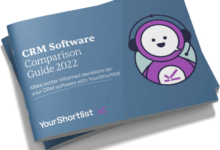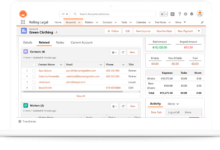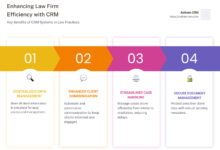Best CRM for Lawyers: Streamline Your Practice
Best CRM for lawyers isn’t just about software; it’s about transforming how you manage clients, cases, and your overall practice. Finding the right CRM can significantly boost efficiency, improve client communication, and ultimately, increase profitability. This guide explores the key features, integrations, security considerations, and cost implications to help you choose the perfect legal CRM for your needs, whether you’re a solo practitioner or part of a large firm.
From contact management and calendaring to robust reporting and crucial security features, we’ll delve into what makes a legal CRM truly effective. We’ll also examine how seamless integrations with other essential legal tools can optimize your workflow and enhance client service. The goal? To empower you with the knowledge to make an informed decision and elevate your legal practice to new heights.
Defining Needs for Legal CRM Software
Choosing the right CRM is crucial for law firms of all sizes. A well-implemented system can streamline operations, improve client relationships, and ultimately boost profitability. The core functionalities, however, vary depending on the firm’s structure and practice area.
Legal CRM software needs to go beyond basic contact management. It must integrate seamlessly with a law firm’s existing workflows, offering tools for case management, document storage, billing, and communication. The ability to track deadlines, manage client interactions, and generate reports are all essential features. A robust search function is also critical for quickly retrieving vital information.
Core Functionalities of Legal CRM Software
A successful legal CRM should provide a centralized hub for all client and case-related information. This includes contact details, case history, deadlines, documents, and communication logs. Features like automated email reminders for deadlines and client follow-ups, secure document storage and sharing, and time tracking capabilities are essential for efficient case management. Integration with other legal software, such as practice management systems and e-signature platforms, is highly beneficial. Reporting and analytics features allow firms to track key metrics and identify areas for improvement.
CRM Needs for Solo Practitioners vs. Large Law Firms
Solo practitioners often require simpler, more affordable CRMs with a focus on client communication and case management. They may prioritize features like appointment scheduling, task management, and basic billing capabilities. In contrast, large law firms need more sophisticated systems that can handle complex workflows, multiple users, and extensive data storage. These systems often include features like matter management, collaboration tools, and advanced reporting and analytics. Security and access control are also paramount considerations for larger firms. For example, a solo practitioner might use a cloud-based CRM like Clio Manage, while a large firm might opt for a more comprehensive, on-premise solution with custom integrations.
Improving Client Communication and Case Management with CRM
CRMs significantly improve client communication through features like automated email sequences, centralized communication logs, and client portals. Client portals allow clients to securely access their case files, communicate with their lawyers, and review billing information. This improves transparency and reduces the administrative burden on the firm. In case management, CRMs automate tasks such as deadline reminders, document management, and task assignments. This helps to reduce errors, improve efficiency, and ensure that cases are handled promptly and effectively. For instance, a CRM can automatically send reminders to a lawyer about an upcoming court date, ensuring that they don’t miss crucial deadlines. Furthermore, a centralized document repository ensures all relevant files are easily accessible to the legal team, reducing the time spent searching for documents.
Selecting CRM Features Based on Legal Practice Area
The specific CRM features needed will vary depending on the legal practice area. For example, family law firms might prioritize features for managing child custody schedules and documenting communication with opposing counsel. Corporate law firms might focus on features for managing complex transactions and regulatory compliance. Criminal defense attorneys may need strong features for managing evidence and communication with clients and investigators. A criminal defense lawyer might prioritize secure messaging and evidence management features within the CRM, while a family law attorney might require features specifically designed for managing calendars and scheduling events related to child custody. Therefore, careful consideration of the firm’s specific needs is crucial when selecting a CRM.
Ultimate Conclusion
Selecting the best CRM for lawyers requires careful consideration of your specific needs and practice size. By understanding the core functionalities, essential integrations, security protocols, and cost implications, you can make a strategic choice that maximizes efficiency, enhances client relationships, and contributes to the overall success of your law firm. Remember, the right CRM is an investment in your future, streamlining operations and allowing you to focus on what matters most: providing exceptional legal services.



